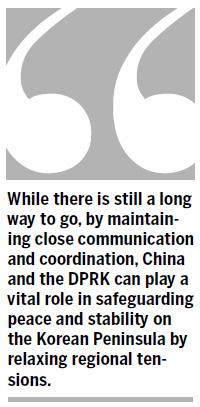
Kim Jong-il, leader of the Democratic People's Republic of Korea (DPRK), paid an unofficial visit to China from May 20 to 26, the third time in just over a year.
The visit had important implications as it took place at a time when the United States and the Republic of Korea (ROK) are holding joint military drills more frequently, the Six-Party Talks, aimed at finding a peaceful resolution to the Korean Peninsular nuclear crisis, have reached an impasse and the DPRK is suffering from food shortages.
The visit signaled Pyongyang's approach to studying China's development and attracting more Chinese investment.
The itinerary for the tour included Tumen, a northeastern Chinese border city, which aims to strengthen economic ties between DPRK's Rason and China's Changchun-Jilin-Tumenjiang Regional Development and Opening-up Pioneer Zone so as to promote local economic growth.
In December 2009, while inspecting Rason, Kim Jong-il emphasized the importance of opening-up and thereafter a series of preferential policies were adopted. Pyongyang also established the national development bank in 2010 in order to attract foreign capital through providing convenient foreign exchange settlement and custom's clearance for foreign enterprises.
Pyongyang is now increasing its efforts to develop the economy. Kim's visit helped promote the construction of the highway connecting China's Hunchun city and Najin in the DPRK and a new bridge across the Yalu River, projects which can help attract more Chinese investment to Rason and Sinuiju.
| ||||
Over the years China has provided assistance to the DPRK aimed at helping the DPRK develop its economy and improve its people's well-being. Last year Seoul cut off nearly all aid and trade to Pyongyang after the sinking of the Cheonan navy vessel, but disasters, coupled with decreasing food assistance and imports, make the country vulnerable to a food crisis. The international community should consider stepping up efforts to provide food aid to the DPRK.
During Kim's visit, both sides exchanged views on the Korean Peninsula situation and emphasized the need to safeguard regional peace and stability.
In spite of repeated signals by Pyongyang that it wants an early resumption of the stalled nuclear talks without any preconditions, Seoul and Washington have remained lukewarm and have stuck to their tough containment policy against the DPRK.
Washington insists on inter-Korean direct talks first before it will hold bilateral discussions with the DPRK. Meanwhile, Seoul demands Pyongyang apologize for the Yeonpyeong shelling and the sinking of the Cheonan and show due sincerity in nuclear disarmament, and sets this as a precondition for resumption of nuclear talks.
While there is still a long way to go, by maintaining close communication and coordination, the China and the DPRK can play a vital role in safeguarding peace and stability on the Korean Peninsula by relaxing regional tensions, and seeking an early resumption of the Six-Party Talks.
The author is an assistant research scholar with the Center for Northeast Asian Studies, a research institution in Jilin Province.
(China Daily 05/30/2011 page8)